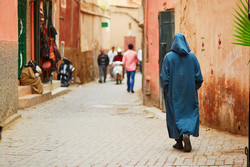The EU foreign policy, viewed from the Maghreb
The project EU-MED INSIGHTS (De-coding European foreign policy from the outside. Views from the Maghreb periphery) conducted research only in Morocco (2013) and Tunisia (2014), due to the civil unrest in Algeria. Research dealt with the postcolonial theoretical concepts of resistance, emancipation and transformation, omitted in previous European and international relations studies. Empirical research highlighted the divide of local political and social opinions, with a risk of undermining or underrepresenting local paradigms of development. From an Islamic perspective, evidence suggests a diversity of what is viewed as acceptable or unacceptable in terms of financial transactions, profits or private property. The zakat, a religious tax, is viewed as obligatory for some and a voluntary contribution for others. The study also examined cases where locals remain silenced on issues of democracy and development, and ways to provide a voice for these persons. Based on the findings, researchers suggest that there should be further investigation into Islam’s silence in matters of economic governance. The study showed that the EU is complicit in creating such silences through its financial and programmatic documents, annual or progress reports or simply verbally during the task force meetings. Researchers used an interdisciplinary perspective, which showed difficulties in transcending boundaries from an ontological and also practical perspective. Policymakers in Brussels and European civil society organisations paid close attention to the project, after the latest developments in the Mediterranean region. The project showed the EU's limited capacity to adapt to local situations, despite the partnership set-up. The study recommended that the EU should focus on improving the absorption capacity of the Maghreb civil society rather than trying to compete with other international actors for matters of financial assistance. It also highlighted the danger of the EU losing its normative power credibility. Research outcomes suggest that the EU should investigate ways to incorporate the Muslim community via its delegations in the Maghreb countries, instead of trying to eradicate Islam from the public sphere. Future research from the scientific community should further investigate the relevance of postcolonial theory.



